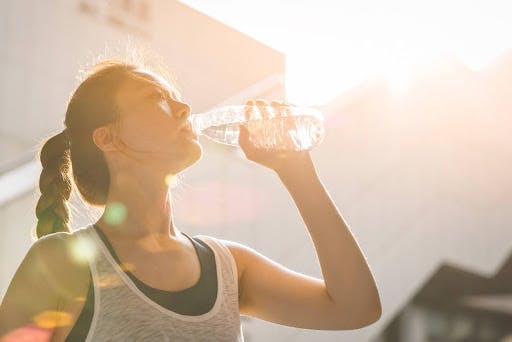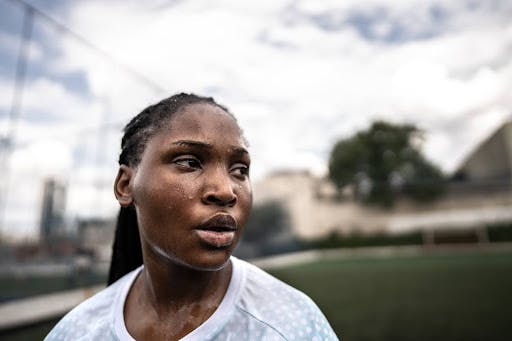The Ultimate Hydration Guide: The 10 Signs of Dehydration & Treatment
Hydration plays an essential role in our physical, mental, and physiological health. Learn more about proper water intake and the 10 signs of dehydration.
Published: December 27, 2023
You may already know this, but hydration is essential to our health. Generally speaking, human beings cannot survive more than three days without water. Compared to food, water has a much shorter time frame before our body begins to suffer from dehydration.
Yet, what exactly do you know about hydration? What about the physiological consequences of dehydration or the best practices for optimal hydration? If you lack a comprehensive understanding of this topic, don’t stress. This guide explores the essentials you need to know about hydration to take proper steps to achieve optimal health.
The Benefits of Hydration: What You Should Know

What exactly is hydration? The term is defined as “the replacement of body fluids that were lost through sweating, exhaling, or waste.” This replacement process occurs daily, which is why your body needs to replace around two to three quarts of water daily. However, water does more than just replace lost bodily fluids.
Water can also:
- Regulate body temperature.
- Keep your joints lubricated.
- Deliver nutrients to cells.
- Ensure organs function properly.
- Refines memory and brain health.
- Improves sleep quality.
- Enhances cognitive health.
- Prevents kidney stones.
These are just a sample of the health benefits you can obtain through proper hydration. Additionally, hydration can also help reduce your weight. How so? Water keeps your hormones running properly while producing hormones affecting weight loss. The question remains: how much water should you be consuming daily?
Let’s discuss this in more detail in the next section.
The Science Over How Much Water You Need
The standard recommendation is four to six cups of water each day. That said, this number is just an average estimate and doesn’t account for other factors that determine how much water you need for optimal wellness.
Depending on your lifestyle and current health, you might have to drink more water to achieve health goals. Here are a few factors to consider when determining how much water you should drink:
Exercise
If you exercise regularly, you’ll need to drink more water than the standard recommendation. When you sweat, your body loses fluids. Increasing your water intake during a workout, especially on a hot day, can minimize heat stress and ensure your body maintains enough fluids for optimal workout performance.

Surrounding Environment
Your surroundings also play a role in how much water your body needs. If you live in an area with scorching heat or high humidity, you’ll need to drink extra water to minimize dehydration. Do you live in a high-altitude area? If so, you’ll need to increase your intake of water. The higher you go, the harder your body has to work to maintain blood oxygen levels. Not to mention, you’ll lose water at a faster rate.
If you’re in an area above 10,000 feet, you should also increase your ingestion of carbohydrates so your body requires less oxygen for metabolism.
Medications
Depending on your medications, you might have to adjust the amount of water you drink daily. For example, certain medications, like laxatives and antacids, can intensify dehydration levels. In other cases, your medications can increase the amount of water lost through your kidneys as urine.
To remain on the safe side, talk with a healthcare provider and determine the best plan if you’re on any medication that could alter your hydration levels.
Age
The older you get, the more water you need. While thirst diminishes, that doesn’t mean you should drink any less water. Older citizens need more water over time because of the changes in their body composition.
Additionally, older citizens are more likely to rely on medications that intensify dehydration, which is why increased hydration is necessary when it comes to age.
Diet
Finally, your diet can also play a significant role when determining your water needs. If you’re a heavy coffee drinker (five cups or more), drink more water. Since caffeine is a diuretic, you lose more water through excessive urination. Also, some foods, like fruits and vegetables, contain sufficient water levels, so you might not need to drink more water than the standard recommendation.
If you’re not consuming hydrating foods regularly, make up for lost fluids by drinking more water than the recommended amount.
The 10 Signs of Dehydration to Note
Dehydration signs can come in many forms, so it is vital to be mindful of the physiological reactions you may experience from insufficient water. Here are 10 signs of dehydration you should know:
- Extreme thirst or lightheadedness
- Decreased amount of urine
- Strong craving for sugar
- Tiredness and dizziness
- Severe headache
- Dry mouth
- Elevated body temperature
- Dark-yellow urine
- Rapid heartbeat
- Feelings of irritability and anxiety

Understand that signs of dehydration can vary based on age. For example, small kids might suffer from dry tongues or dry lips when dehydrated. They might also show signs of having wrinkled skin.
What Are the 3 Levels of Dehydration?
From a medical standpoint, dehydration is split into three levels:
- Mild: Mild symptoms of dehydration are simple to treat. At this point, your body loses about five to six percent of its fluids. Common symptoms include headaches, which you can treat by taking more fluids.
- Moderate: Your body loses between seven to 10 percent of its fluids at this level. You might also notice troubling symptoms such as dry skin, reduced urine, and low blood pressure.
- Severe: At this state, IV fluids become necessary to restore the body’s fluid levels before symptoms worsen. You’ll become lightheaded, nauseous, and eventually pass out without evasive treatment.
What Is the Fastest Way to Cure Dehydration?
The fastest way would be to drink water. Additionally, you should drink fluids containing high levels of electrolytes. This will make it easier for your body to balance the water it needs while moving waste out of your cells. If you show signs of severe dehydration, then a trip to the emergency room is in order.
What Counts as Hydration? Alternative Choices for Dehydration Treatment.
The good news is dehydration can be minimized with proper water intake. Plus, plenty of beverages can replenish your body's water supply while keeping it in good health. Some essential alternatives you can use as dehydration treatment include:
- Milk
- Juice
- Herbal tea
- Sports drinks with electrolytes
- Fruits and vegetables, like spinach, tomatoes, and cabbages
- Dairy products, including yogurt and cottage cheese
Remember, the average person obtains 20% of their daily fluid intake from food. The rest comes from beverages. This means you can accommodate for the lack of water through foods that stabilize fluid and hydration levels. Also, as an added tip, minimize your reliance on sugary drinks and alcohol.
While these beverages seem tempting, sugary products, like soda, contain excessive amounts of sugar that lead to weight gain and type 2 diabetes. Also, since alcohol is a diuretic that elevates urine production, it can intensify dehydration.
Get Hydrated with Truvy Selections
If you’re tired of relying on tasteless water to satisfy your hydration needs, switch to our H&H+ TM Super Drink. Our hydration drinks contain zero sugar and 100mg of caffeine for some energy boost. Choose from a variety of flavors and give yourself the satisfaction of a mouthwatering beverage.
Alternatively, you can select our Tru+ & Vy 30-Day Kit or truFIXⓇ Drink. Whether you need something that supports healthy blood sugar, maintains a proper cholesterol level, or helps with weight management, you get all those benefits and adequate hydration.
Hydration with Truvy
Hydration is essential for maintaining good health and avoiding complications that disrupt your physiological well-being. At Truvy, we understand how critical hydration is for health in the long run, which is why we offer specially formulated solutions that can keep a steady supply of water in your body.
Check out our specially formulated hydration products and see how you can enhance your well-being.